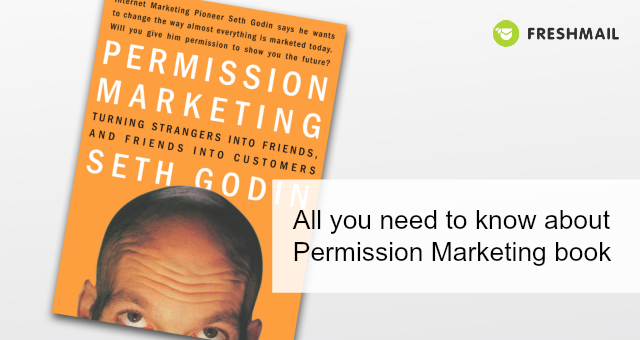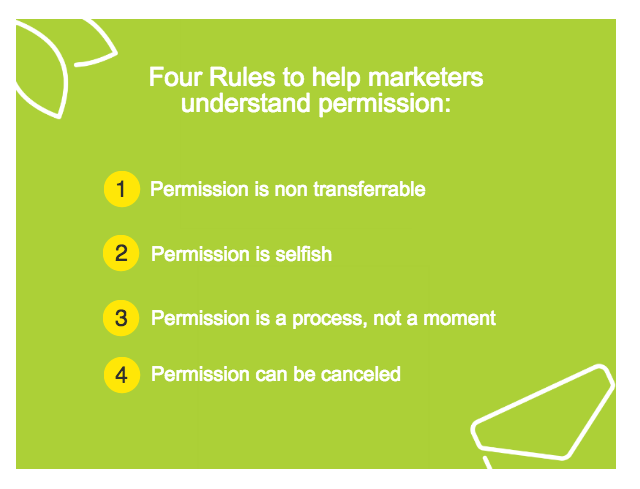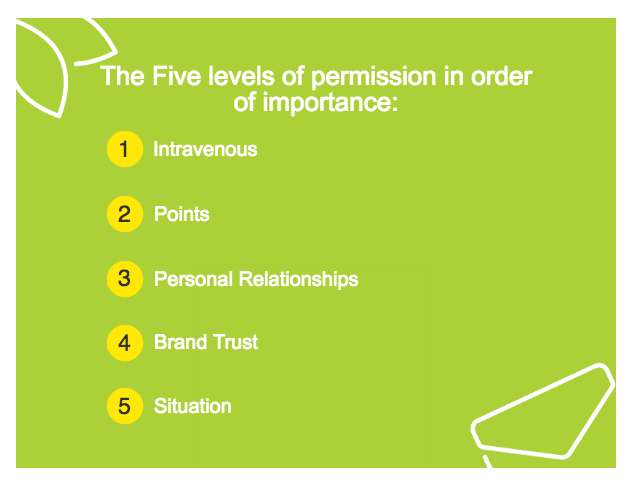 Eliza Gniadek
created
edited
Eliza Gniadek
created
edited
Why you need to know all about Permission Marketing book
Back to list of articlesIntrusive, unwelcome internet advertisements aren’t the best way to accomplish your marketing goals. If you don’t target your marketing messages, you reach lots of people who have no interest in you or your product. You’re simply irritating them and wasting your budget.
If you want to reach people who are interested in what you have to share about your brand, you need to use permission marketing. The man behind this idea is Seth Godin and he explains it in his book of the same name. If you haven’t read it yet, you need to start - now!

Here’s what you’ll learn:
- The fundamental concepts of permission marketing
- How not to waste your marketing budget on ineffective mass advertisements
- The four rules of what constitutes permission
- Why permission marketing works in email marketing campaigns
About the author
Seth Godin is an American marketer, entrepreneur, speaker and author of many books about marketing. He is well known for his creation of the concept of permission marketing.

In his book, Seth describes the problems associated with the huge volume of advertisements we receive. He points out that creating and paying for even more ads is neither beneficial nor effective for marketers but they still stick to the old way of dealing with the problem of being heard in the marketplace:
It’s ironic that marketing specialists react to this situation in the worst possible way. To deal with the flood of advertisements and make them effective again, they decided to interfere with us even more!
Godin calls this kind of advertising “interruption marketing”. This is the exact opposite of permission marketing.
Interestingly, Seth compares permission marketing to…..a date!

Here are the 5 steps of this “date”:
- Offering potential customers something that interests them
- Using the attention this brings as a chance to offer more information about your product or service
- Increase the attractiveness of your message to keep potential customers engaged
- Offer additional incentives to gain yet more permission to engage from potential customers
- With the passage of time, use that permission to reach your sales goals
What is the most important element of a dating relationship? It’s how often you meet with each other and how that time together builds mutual trust. The same principle applies to marketing relationships as well. The quality of the relationships you build is much more important than the number of relationships you try to start.
What exactly is permission?
Seth uses four rules that help to illustrate just what he means by “permission”.

Permission Marketing also outlines five levels of permission that describe the stages of trust between a customer and a company and the consent customers give to meet their needs.

Less means more
Godin also puts forth an interesting idea - why eliminating 70% of your customers might be good for your company.
Sometimes you have to follow through with a business’ worst nightmare - losing customers. This is the price of optimising the customer service process. People who distract you, who demand discounts or require extra time and resources and who don’t generate a proportionate amount of profit are a burden.
Permission marketing in email marketing
The rules of permission marketing prove themselves in email marketing. Collecting email addresses using the double opt-in model is a basic method of receiving consent to send newsletters to subscribers.
Apart from receiving that consent, using permission marketing in email campaigns brings additional benefits. First of all, you are sure that you are sending your message to a real person and not to a random email address. This gives you the chance to build relationships with subscribers and move them along the conversion funnel. On top of that, permission marketing means that subscribers are interested and receptive to your communication and are more likely to engage with it.
The bottom line
Permission Marketing is obligatory for every e-marketer. It’s relevant to anyone promoting a message, especially in the mass media. It’s a new perspective on the challenge of forming the most effective marketing campaigns. Seth Godin, writing in 1999, foresaw a new era in marketing communication that is still applicable to the contemporary marketing landscape and his book has many timeless lessons to share.
See more:

